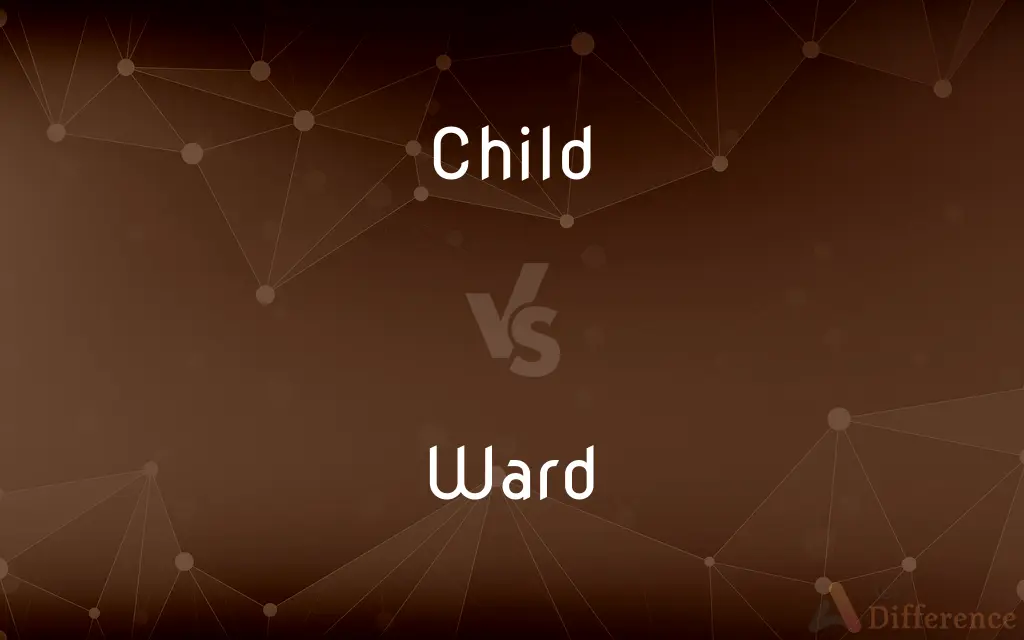Child vs. Ward — What's the Difference?
By Tayyaba Rehman — Updated on October 12, 2023
A "Child" is a young human being, typically under 18, while a "Ward" refers to a person, often a minor, under the protection and legal oversight of a guardian or court.

Difference Between Child and Ward
Table of Contents
ADVERTISEMENT
Key Differences
A child generally signifies a person who is in the initial stages of their life, typically someone under the age of 18. On the other hand, a ward, while often also a minor, implies a certain legal relationship wherein the individual is placed under the guardianship of another person or entity. The child is a universal term without inherent legal connotations.
Delving into the familial context, a child is naturally or legally related to their parents, inheriting both social and biological aspects from them. Conversely, a ward does not denote any biological relationship but establishes a distinct legal and social connection between the guardian and the individual. The nature of care given to a ward is stipulated by legal parameters.
In social contexts, being a child usually involves a period of growth, learning, and dependence on parental figures for physical and emotional support. For a ward, the relationship with the guardian may involve social support, but is primarily anchored in legal and logistical safeguarding. The ward’s well-being and interests are the guardian's responsibility as dictated by law.
Children generally attain rights and responsibilities as they mature into adulthood, often upon reaching the age of majority. Wards, depending on the specifics of the guardianship arrangement, might experience limitations or extensions of certain rights, especially when the wardship persists into adulthood due to mental or physical incapacities.
Comparison Chart
Definition
A young human being
A person under the guardianship of another
ADVERTISEMENT
Legal Implication
Generally, none
Implies a legal guardianship relationship
Biological Link
Often biological or adopted child
No biological implication
Age Connotation
Typically under 18
Can be of any age
Autonomy
Gains autonomy with adulthood
May not gain autonomy depending on the case
Compare with Definitions
Child
A person’s offspring, regardless of age.
My parents treated me like a child even in my 30s.
Ward
A separate room or area in a hospital.
The nurse escorted the patient to the cardiac ward.
Child
An immature or irresponsible person.
Stop being such a child and take responsibility!
Ward
A part or division of a prison.
The ward was full, so they couldn’t accept new prisoners.
Child
Someone who is strongly influenced by something.
She was a child of the theater, attending every play possible.
Ward
A room in a hospital usually holding six or more patients.
Child
A person who is a member of a tribe or people.
They welcomed me as a child of their nation.
Ward
A division in a hospital for the care of a particular group of patients
A maternity ward.
Child
Biologically, a child (plural children) is a human being between the stages of birth and puberty, or between the developmental period of infancy and puberty. The legal definition of child generally refers to a minor, otherwise known as a person younger than the age of majority.
Ward
A division of a city or town, especially an electoral district, for administrative and representative purposes.
Child
A person between birth and puberty.
Ward
A district of some English and Scottish counties corresponding roughly to the hundred or the wapentake.
Child
A person who has not attained maturity or the age of legal majority.
Ward
One of the divisions of a penal institution, such as a prison.
Child
An unborn infant; a fetus.
Ward
An open court or area of a castle or fortification enclosed by walls.
Child
An infant; a baby.
Ward
(Law) A minor or a person deemed legally incompetent.
Child
One who is childish or immature.
Ward
A person under the protection or care of another.
Child
Someone to whom a specified person is a parent.
Ward
The act of guarding or protecting; guardianship.
Child
A member of a tribe; descendant
Children of Abraham.
Ward
The act of keeping watch or being a lookout.
Child
An individual regarded as strongly affected by another or by a specified time, place, or circumstance
A child of nature.
A child of the Sixties.
Ward
The state of being under guard; custody.
Child
A product or result of something specified
“Times Square is a child of the 20th century” (Richard F. Shepard).
Ward
A defensive movement or attitude, especially in fencing; a guard.
Child
A person who has not yet reached adulthood, whether natural (puberty), cultural (initiation), or legal (majority).
Go easy on him: he is but a child.
Ward
The projecting ridge of a lock or keyhole that prevents the turning or insertion of a key other than the proper one.
Child
A kid aged 1 to 11 years, whereas neonates are aged 0 to 1 month, infants are aged 1 month to 12 months, and adolescents are aged 12 years to 18 years.
Regular chores can be appropriate for both children and adolescents, given age-appropriate limits on difficulty level and time on task.
Ward
The notch cut into a key that corresponds to such a ridge.
Child
(with possessive) One's direct descendant by birth, regardless of age; one's offspring; a son or daughter.
My youngest child is forty-three this year.
His adult children visit him yearly.
Ward
To guard; protect.
Child
(cartomancy) The thirteenth Lenormand card.
Ward
A warden; a guard; a guardian or watchman.
Child
(figurative) A figurative offspring, particularly:
Ward
Protection, defence.
Child
A person considered a product of a place or culture, a member of a tribe or culture, regardless of age.
The children of Israel.
He is a child of his times.
Ward
(obsolete) A guard or watchman; now replaced by warden.
Child
Anything derived from or caused by something.
Ward
The action of a watchman; monitoring, surveillance keep ward etc.}}
Child
(computing) A data item, process, or object which has a subservient or derivative role relative to another.
The child node then stores the actual data of the parent node.
Ward
Guardianship, especially of a child or prisoner.
Child
Youth of noble birth
Ward
An enchantment or spell placed over a designated area or social unit, that prevents any tresspasser from entering; approaching; or even being able to locate said protected premises or demographic.
Child
(mathematics) A subordinate node of a tree.
Ward
Land tenure through military service.
Child
A female child, a girl.
Ward
(fencing) A guarding or defensive motion or position.
Child
To give birth; to beget or procreate.
Ward
A protected place, and by extension, a type of subdivision.
Child
A son or a daughter; a male or female descendant, in the first degree; the immediate progeny of human parents; - in law, legitimate offspring. Used also of animals and plants.
Ward
An area of a castle, corresponding to a circuit of the walls.
Child
A descendant, however remote; - used esp. in the plural; as, the children of Israel; the children of Edom.
Ward
A section or subdivision of a prison.
Child
One who, by character of practice, shows signs of relationship to, or of the influence of, another; one closely connected with a place, occupation, character, etc.; as, a child of God; a child of the devil; a child of disobedience; a child of toil; a child of the people.
Ward
An administrative division of a borough, city or council.
On our last visit to Tokyo, we went to Chiyoda ward and visited the Emperor's palace.
Child
A noble youth. See Childe.
Ward
(UK) A division of a forest.
Child
A young person of either sex. esp. one between infancy and youth; hence, one who exhibits the characteristics of a very young person, as innocence, obedience, trustfulness, limited understanding, etc.
When I was child. I spake as a child, I understood as a child, I thought as a child; but when I became a man, I put away childish things.
Ward
(Mormonism) A subdivision of the LDS Church, smaller than and part of a stake, but larger than a branch.
Child
A female infant.
A boy or a child, I wonder?
Ward
A part of a hospital, with beds, where patients reside.
Child
To give birth; to produce young.
This queen Genissa childing died.
It chanced within two days they childed both.
Ward
A person under guardianship.
Child
A young person of either sex;
She writes books for children
They're just kids
`tiddler' is a British term for youngsters
Ward
A minor looked after by a guardian.
After the trial, little Robert was declared a ward of the state.
Child
A human offspring (son or daughter) of any age;
They had three children
They were able to send their kids to college
Ward
(obsolete) An underage orphan.
Child
An immature childish person;
He remained a child in practical matters as long as he lived
Stop being a baby!
Ward
An object used for guarding.
Child
A member of a clan or tribe;
The children of Israel
Ward
The ridges on the inside of a lock, or the incisions on a key.
Child
A young human being below the age of puberty.
The park was filled with playing children.
Ward
(transitive) To keep in safety, to watch over, to guard.
Ward
(transitive) To defend, to protect.
Ward
(transitive) To fend off, to repel, to turn aside, as anything mischievous that approaches off}}
Ward
(intransitive) To be vigilant; to keep guard.
Ward
(intransitive) To act on the defensive with a weapon.
Ward
One who, or that which, guards; garrison; defender; protector; means of guarding; defense; protection.
For the best ward of mine honor.
The assieged castle's wardTheir steadfast stands did mightily maintain.
For want of other ward,He lifted up his hand, his front to guard.
Ward
The state of being under guard or guardianship; confinement under guard; the condition of a child under a guardian; custody.
And he put them in ward in the house of the captain of the guard.
I must attend his majesty's command, to whom I am now in ward.
It is also inconvenient, in Ireland, that the wards and marriages of gentlemen's children should be in the disposal of any of those lords.
Ward
A guarding or defensive motion or position, as in fencing; guard.
Ward
One who, or that which, is guarded.
Ward
A minor or person under the care of a guardian; as, a ward in chancery.
Ward
A projecting ridge of metal in the interior of a lock, to prevent the use of any key which has not a corresponding notch for passing it.
The lock is made . . . more secure by attaching wards to the front, as well as to the back, plate of the lock, in which case the key must be furnished with corresponding notches.
Ward
A division of a county.
Ward
A division, district, or quarter of a town or city.
Throughout the trembling city placed a guard,Dealing an equal share to every ward.
Ward
A division of a forest.
Ward
A division of a hospital; as, a fever ward.
Ward
To keep in safety; to watch; to guard; formerly, in a specific sense, to guard during the day time.
Whose gates he found fast shut, no living wightTo ward the same.
Ward
To defend; to protect.
Tell him it was a hand that warded himFrom thousand dangers.
Ward
To defend by walls, fortifications, etc.
Ward
To fend off; to repel; to turn aside, as anything mischievous that approaches; - usually followed by off.
Now wards a felling blow, now strikes again.
The pointed javelin warded off his rage.
It instructs the scholar in the various methods of warding off the force of objections.
Ward
To be vigilant; to keep guard.
Ward
To act on the defensive with a weapon.
She redoubling her blows drove the stranger to no other shift than to ward and go back.
Ward
A person who is under the protection or in the custody of another
Ward
A district into which a city or town is divided for the purpose of administration and elections
Ward
Block forming a division of a hospital (or a suite of rooms) shared by patients who need a similar kind of care;
They put her in a 4-bed ward
Ward
English economist and conservationist (1914-1981)
Ward
English writer of novels who was an active opponent of the women's suffrage movement (1851-1920)
Ward
United States businessman who in 1872 established a successful mail-order business (1843-1913)
Ward
A division of a prison (usually consisting of several cells)
Ward
Watch over or shield from danger or harm; protect;
Guard my possessions while I'm away
Ward
An individual, often a minor, under legal guardianship.
After his parents' death, he became a ward of his uncle.
Ward
A subdivision in certain US cities.
She campaigned vigorously in every ward of the city.
Ward
A defensive or protective barrier.
The wizard cast a ward to protect the village.
Common Curiosities
Can a child be a ward?
Yes, if the child is under legal guardianship, they are a ward.
Is every child legally bound to their parents?
Yes, parents typically have legal rights and duties concerning their child.
Is a child always related biologically to parents?
No, a child can be biological, adopted, or step.
Can a ward have their own legal autonomy?
Not typically, as wards are under the guardianship due to lack of autonomy.
What is the primary difference between a child and a ward?
A child is a young human, while a ward is someone under legal guardianship.
Can a ward be an adult?
Yes, a ward can be an adult under specific guardianship conditions.
Does a ward always have a legal guardian?
Yes, a ward is under the legal guardianship of a person or entity.
Can a ward manage their financial affairs?
Often, a guardian manages a ward’s financial affairs.
Is a child legally accountable for actions?
Children may face different legal procedures and accountability.
What rights does a child have?
Children have rights to protection, education, and basic needs fulfillment.
What age defines a person as a child?
Legally, a child is typically a person under 18 years.
Can a ward's guardian be an entity?
Yes, a ward’s guardian can be an individual or an entity, like a state agency.
Can a ward live independently?
It depends on the specific guardianship terms and the ward’s capabilities.
Can a person be a ward due to physical incapacities?
Yes, wards can be designated due to physical or mental incapacities.
Do children have legal responsibilities?
Children may have limited legal responsibilities, varying by jurisdiction.
Share Your Discovery

Previous Comparison
Trolley vs. Dolly
Next Comparison
Tie vs. DrawAuthor Spotlight
Written by
Tayyaba RehmanTayyaba Rehman is a distinguished writer, currently serving as a primary contributor to askdifference.com. As a researcher in semantics and etymology, Tayyaba's passion for the complexity of languages and their distinctions has found a perfect home on the platform. Tayyaba delves into the intricacies of language, distinguishing between commonly confused words and phrases, thereby providing clarity for readers worldwide.














































